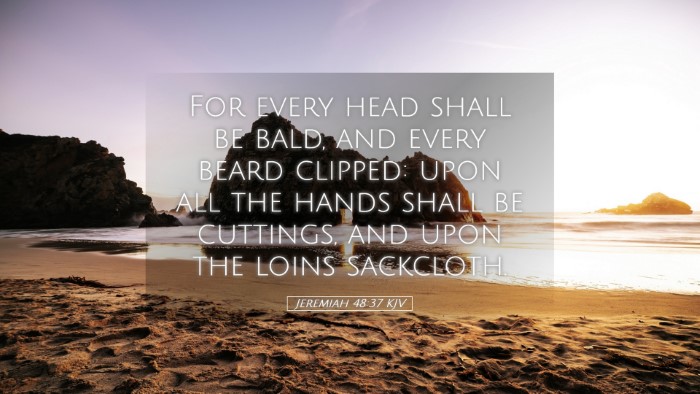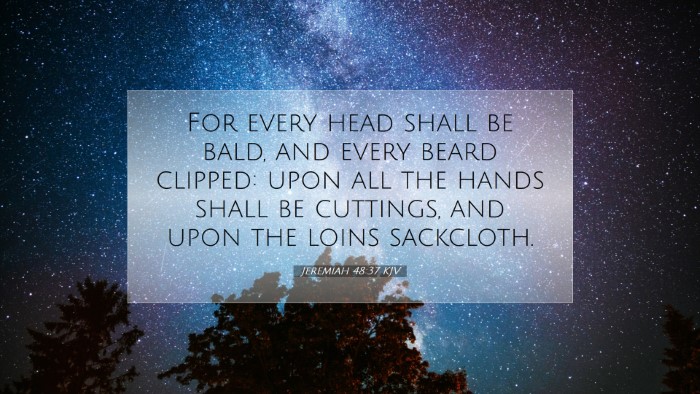Commentary on Jeremiah 48:37
Jeremiah 48:37 states, "For every head shall be bald, and every beard clipped: upon all the hands shall be cuttings, and upon the loins sackcloth." This verse serves as a profound symbol of mourning and despair for the Moabites, reflecting the overall theme of judgment that permeates the book of Jeremiah.
General Context
The book of Jeremiah addresses the impending judgment of Judah and the surrounding nations. In chapters dedicated to Moab, the prophet elaborates on the coming desolation that will befall this nation due to its idolatry and rebellion against God. Through vivid imagery and cultural practices, Jeremiah encapsulates the depth of grief that such a fate entails.
Historical Background
Understanding the significance of the verse requires a grasp of the historical context of Moab. Situated east of the Jordan River, Moab was often at odds with Israel. The Moabites worshiped Chemosh and were involved in numerous military conflicts against Israel, as recorded in the Old Testament. Jeremiah's prophecy serves as a divine denunciation of their actions and a prediction of their utter downfall.
Exegesis of Key Phrases
- Baldness and Clipped Beards: In ancient Near Eastern cultures, baldness and the act of shaving the beard were powerful symbols of mourning and shame (Matthew Henry). It signified a deep humiliation, as hair was tied to one's identity and dignity. This imagery indicates that the Moabites will be utterly shamed and devastated.
- Cuttings on the Hands: The practice of cutting as an expression of mourning or dedication was prevalent in various cultures surrounding Israel. Here, it serves as a picture of extreme sorrow and an outward sign of distress (Albert Barnes). Such practices indicated an acknowledgment of loss, suggesting that the Moabites will mourn the grab of judgment laid upon them.
- Sackcloth: The use of sackcloth is another significant indicator of mourning, reflecting repentance or sorrow for sin (Adam Clarke). This fabric, often made from coarse material, would serve as a painful reminder of their plight and a visual symbol of their desperate state before God.
Theological Implications
Theologically, this verse underscores the severity of divine judgment against sin. Even nations that are not God's chosen people are subject to His justice. It reflects the universal principles of God’s holiness and the inevitable consequences of turning away from Him.
Judgment and Mercy
While the focus is on judgment, there is an implicit call to repentance. The prophetic cry of judgment carries with it an underlying message of warning. Throughout Scripture, God's desire is for repentance and restoration, rather than punishment. Jeremiah's words serve as a reminder of the need for nations and individuals to seek reconciliation with the Almighty.
The Role of Prophecy
Jeremiah, as a prophet, stands as a beacon of God’s voice to a people straying from His commands. The prophetic tradition emphasizes that such proclamations are not merely about destruction; they are invitations to turn from wickedness and return to righteousness.
Application for Today’s Believers
For contemporary readers, Jeremiah 48:37 compels reflection on several levels:
- Identity in Christ: Just as baldness and shaving signify loss of identity for the Moabites, believers are reminded of their identity in Christ. Mourning for sin should lead to repentance, restoring one's identity through God's grace.
- Expression of Grief: The act of mourning in this verse invites readers to consider how they express grief and sorrow over sin in their lives and communities. Are we acknowledging our collective and personal failures before God?
- Impact of Idolatry: The admonition against idolatry serves as a lesson for today’s church. What modern "idols" distract from the worship of the one true God? This verse challenges believers to examine their loyalties.
- Call to Urgency:** The passage ultimately speaks to the urgency of prophetic calls in a world resistant to truth. The call to repentance remains as relevant as ever as we seek to guide others back to God.
Conclusion
Jeremiah 48:37 captures a poignant moment of mourning and judgment, delivering a powerful message to both the Moabites and modern believers. It serves as a reminder of the seriousness of sin, the nature of God's justice, and the call to repentance. Through studying such verses, pastors, students, theologians, and scholars can glean insights not only into God’s character but also into their own lives and the communities around them.


